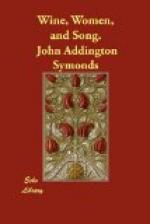It is not necessary to censure their lack of so-called chivalrous woman-worship. That artificial mood of emotion, though glorified by the literary art of greatest poets, has something pitiably unreal, incurably morbid, in its mysticism. But, putting this aside, we are still bound to notice the absence of that far more human self-devotion of man to woman which forms a conspicuous element in the Arthurian romances. The love of Tristram for Iseult, of Lancelot for Guinevere, of Beaumains for his lady, is alien to the Goliardic conception of intersexual relations. Nowhere do we find a trace of Arthur’s vow imposed upon his knights: “never to do outrage,... and alway to do ladies, damosels, and gentlewomen succour upon pain of death.” This manly respect for women, which was, if not precisely the purest, yet certainly the most fruitful social impulse of the Middle Ages, receives no expression in the Carmina Vagorum.
The reason is not far to seek. The Clerici were a class debarred from domesticity, devoted in theory to celibacy, in practice incapable of marriage. They were not so much unsocial or anti-social as extra-social; and while they gave a loose rein to their appetites, they respected none of those ties, anticipated none of those home pleasures, which consecrate the animal desires in everyday existence as we know it. One of their most popular poems is a brutal monastic diatribe on matrimony, fouler in its stupid abuse of women, more unmanly in its sordid imputations, than any satire which emanated from the corruption of Imperial Rome.[35] The cynicism of this exhortation against marriage forms a proper supplement to the other kind of cynicism which emerges in the lyrics of triumphant seducers and light lovers.
But why then have I taken the trouble to translate these songs, and to present them in such profusion to a modern audience? It is because, after making all allowances for their want of great or noble feeling, due to the peculiar medium from which they sprang, they are in many ways realistically beautiful and in a strict sense true to vulgar human nature. They are the spontaneous expression of careless, wanton, unreflective youth. And all this they were, too, in an age which we are apt to regard as incapable of these very qualities.
The defects I have been at pains to indicate render the Goliardic poems remarkable as documents for the right understanding of the brilliant Renaissance epoch which was destined to close the Middle Ages. To the best of them we may with certainty assign the seventy-five years between 1150 and 1225. In that period, so fruitful of great efforts and of great results in the fields of politics and thought and literature, efforts and results foredoomed to partial frustration and to perverse misapplication—in that potent space of time, so varied in its intellectual and social manifestations, so pregnant with good and evil, so rapid in mutations, so indeterminate between




